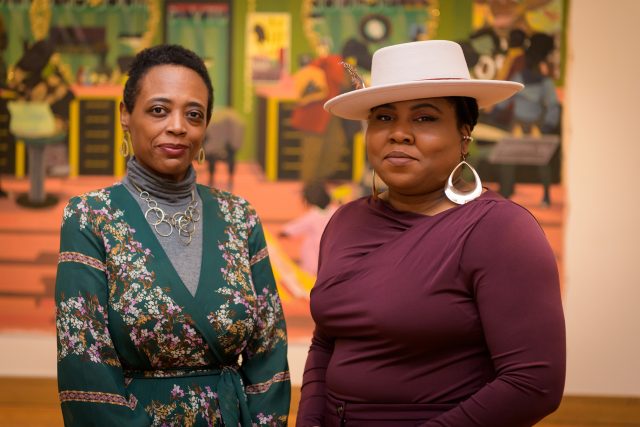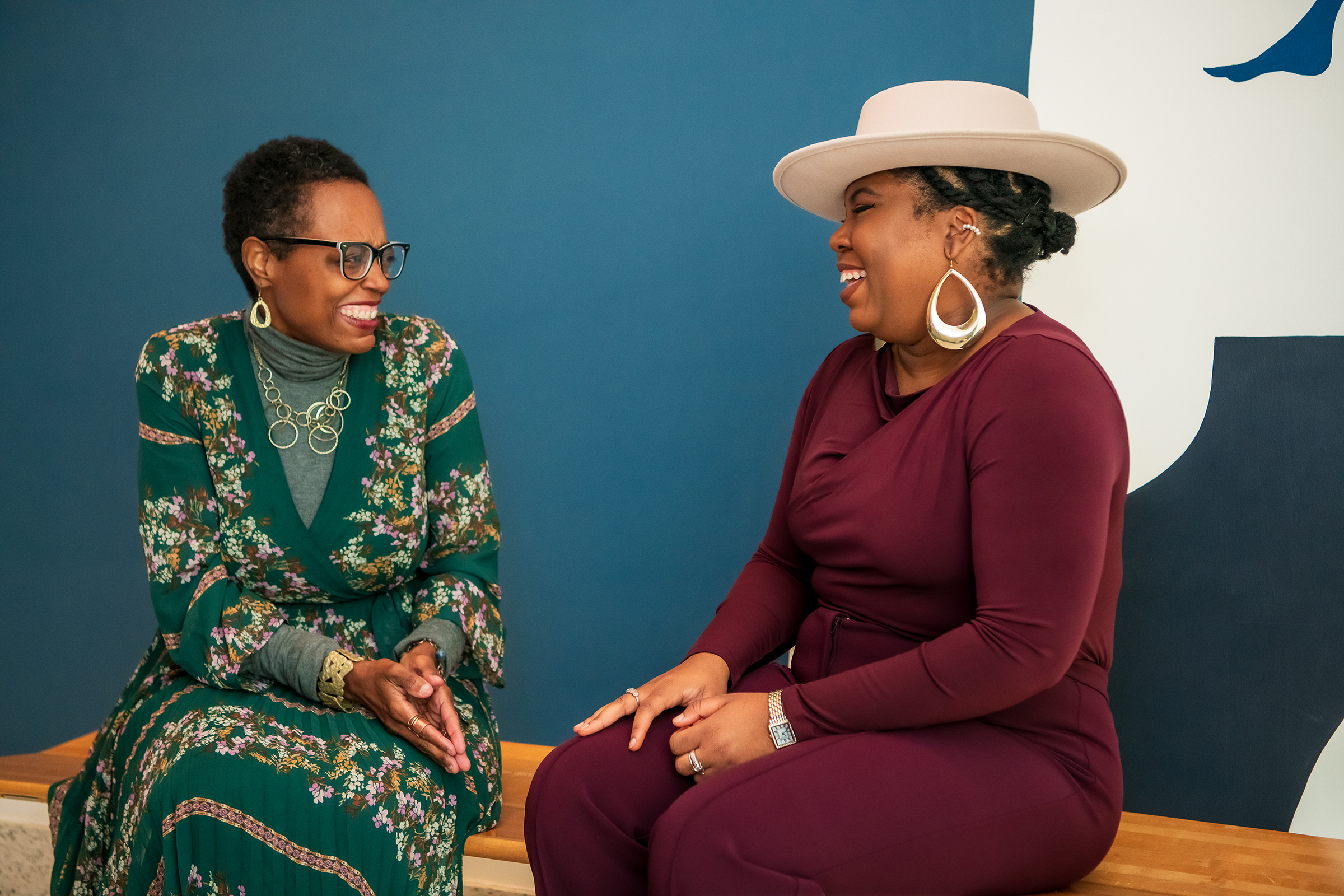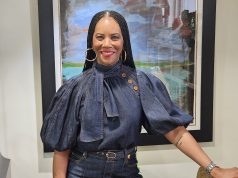
By Javacia Harris Bowser | For The Birmingham Times
It’s a sunny Tuesday in January, and Salaam Green is making a couple of stops in the Magic City. First, she attends a Birmingham City Council meeting, which is no ordinary gathering—it’s where she is sworn in as Birmingham’s first Poet Laureate. Now, Green is arriving at the Birmingham Museum of Art for a conversation with another local poet who has made history—Ashley M. Jones, Poet Laureate of the state of Alabama.
In 2021, Jones was tapped to serve as the state’s Poet Laureate from 2022 to 2026. Jones, 33, is the first person of color and the youngest person to hold this position since it was established in Alabama 93 years ago.
In December, Green, 48, was announced as the city of Birmingham’s inaugural 2024–2025 Poet Laureate. Green is the founder and director of The Literary Healing Arts, a program designed to “promote the healing power of words,” and a certified trainer for the Kellogg Foundation’s Truth, Racial Healing & Transformation (TRHT) initiative.
She is also well known in the local literary community for leading her “Write to Heal” workshops—a series of seminars that teach both individuals and organizations how to use poetry, writing, and storytelling to reclaim their voices and change their lives.
The Birmingham Times brought the two Poets Laureate together for a Women’s History Month exclusive, where they share words of wisdom and encouragement, moments of laughter, and heartfelt love and joy with one another.

Green on what it meant to her when she learned that Jones had been selected as Alabama’s youngest and first African American Poet Laureate.
Green: I don’t cry a lot, but I was feeling teary. The idea of Alabama doing something right. The idea of you not just stepping into this role, but this role I feel like you were birthed to do—it felt like my cousin, my play cousin, my sister is over there, and look at what she’s doing.
[Speaking to Jones] Just to see your beautiful face all over the place—it meant so much. So, I just want to say thank you for being you and for giving me the opportunity to celebrate that. It was monumental.
Jones: That means a lot to hear you say. I love your work, and I’m just so grateful for what you do. For you to say that you’re proud of me, that makes me feel like I’m doing something right. Everything I do, I feel like, is in service of the people. For me, the respect of my peers means everything. These higher-up people—they’re whatever. But people who are on the ground, if you think I’m worth it, that means it’s true. If some person up in New York says, ‘Oh, we like you,’ it doesn’t necessarily mean as much to me. So, I really do appreciate that.
Green: I remember your [debut poetry collection], “Magic City Gospel,” and taking it into my “Write to Heal” workshops. I’m like, “OK, I’m taking this book everywhere!” It has a beautiful cover number one, but also for young people to see the covers of books with the names of our people on them.
And then they see you transition into this monumental role and see that you’re everywhere, even on [ABC’s a.m. news program] “Good Morning America.” You stepped into your dream, into your destiny. And then others can see themselves in you.
Jones: When I was on “Good Morning America,” y’all went up there with me. No, you weren’t there physically, but I was like, “OK, I’ve got to make all my people proud. I can’t be on this TV talking crazy.”
Jones reflects on learning there would be a city of Birmingham Poet Laureate and that Green had been selected.
Jones: I was really excited to find out they wanted to start one. Our city is just so vibrant and so full of artists, and I feel like it’s not enough to have somebody just for the state. Somebody needs to represent us, very specifically. So, when I found out that it was going to happen, I hoped that it would be someone who really had a spirit of the city, someone who was involved already, not just someone who wanted to put something on their resume.
Green: I don’t think I even have a resume.
Jones: When I found out it was you, I was so ecstatic. Of course, I was very proud that it was another Black woman. I think we do everything wonderfully, but to know that you would be the one spreading your message of healing and authentic life to everybody in Birmingham—that was amazing to me. I was just so elated. I know you’re going to take our city to a new level with poetry and show people what you can do. I’m just so excited. I cannot wait.
Green shares why she decided to apply for the role of Birmingham’s first Poet Laureate.

Green: I was so excited when I heard that the Alabama State Council of Arts had decided to do this. I looked at the application, but I came aboard a little bit late. I put my application in probably an hour before it was time to be submitted. That is so like me.
[In August 2023, Create Birmingham, in partnership with the city of Birmingham and through funds by the Alabama State Council on the Arts and the Birmingham City Council’s Cultural Arts Committee, began accepting applications for Birmingham’s inaugural 2024–2025 Poet Laureate.]
Jones: Wow! Clearly, it was meant for you.
Green: I had so many people who were encouraging me, so many people who I was inspired by, but I’m thinking, “This is the Magic City that is full of poets and spoken word artists like this person and this person.” Other people kept saying, “Just try.” So, toward the end [of the submission period], I filled out the application hurriedly. I thought, as a Black woman who is aging with wisdom and as a Black woman who has touched the city and who the city has touched, why not just try and trust and believe.
Jones on what she’s learned during her first two years as Alabama’s Poet Laureate.
Jones: The first thing I would say is, honor your downtime. Before anybody asks you to do anything, know what time of yours untouchable. That is the biggest mistake I’ve made just generally in life but certainly in my first two years as Poet Laureate. I was so eager to just be there for everybody, not realizing that I needed to take time for me in order to show up better wherever I was asked to go. The second biggest thing is just to really stay true to who you are, which is what’s so great about you already—that you are always Salaam, all the time. You always bring your spirit to everything. Just try to protect that. You’ll be asked to write for various occasions, and sometimes that can make you feel like you’re not speaking as yourself. But the reason you were selected is because of who you are, so protect yourself and your own spirit at all costs because that’s the thing people want to experience, that’s what’s going to bring people to poetry and together, as well.
Green: That’s powerful.
Jones: The third thing I would say—and this one may be a little silly, but it’s me, so I’m going to say it—have a few go-to outfits ready for certain types of occasions. You know you’re going to have your official stuff, so get you a couple of suits that are just ready to go and good to photograph. And the value of the hat—I really cannot overstate that because sometimes, at least for me, the afro doesn’t want to act right. The hat will eliminate any issue.
Green: I love that. I know the value of a head wrap. Believe me.
Green asks for more advice on being a Poet Laureate.
Green: You’ve been doing this for a while, and it’s been a pleasure to watch you do this. But also, it’s been a pleasure to watch you stay true to yourself. How have you done that? Your identity, your fashion, your private life, your public life? How have you stayed true to Ashley?
Jones: It hasn’t necessarily been easy. I always feel like I’m being pulled in a lot of directions all the time. But I’d say one thing is knowing who your people are and keeping them close. So, for me, that’s my family and my boyfriend. Having my core group of people who will hold me accountable, who keep me humble. My mom will always say, “You’re not going to get the big head as long as I’m here.” And I have not.
Having people that you can really be real with and vent to, as well. When you’re a public figure, you really can’t vent in a public space. Yes, we are poets, and we vent in our poetry, but there’s a certain other level that we’re at now as public officials. So, having those people who are a safe space for you is vital. That’s going to help you to maintain yourself. It’ll help you to face every situation. If you’re able to bounce ideas off of somebody you trust, that is key.
Also, I keep reminding myself, the reason that I have this position is because of me, because of who I am already. I didn’t have to put on any airs to get the position, so I don’t have to do that to keep the position.
Green shares her Poet Laureate platform.
Green: The Poet Laureate, as you know, came with duties and responsibilities already. So, I’m elated to do those things and many of those things I was doing in the city already. But I think one of the biggest things that I really want to do is look at how do we use poetry as a political activation, particularly in a Civil Rights– and justice-oriented city. And this is an election year. There are some charged emotions. For me, part of my tenure is looking at poetry as a healing tool, a political activation tool, and a tool for advocacy. And then also a tool so that others can see, yes, you can spit poetry. Yes, you can perform poetry. Yes, you can do all those beautiful things. Poetry also can take you into rooms, it can take you into spaces, it can take you into legislative houses. I want to talk to government officials about how we can activate poetry into public spaces and the political realm.
Jones: I’m voting for you for president.
Green shares life advice for Jones.
Green: First of all, don’t let anyone tell you that any age has any limitation. But I would say my biggest advice—and this is what I would say to any Black woman—is stay as Blackity Black as you possibly can. I’m talking about collard greens. I’m talking about sitting around barefoot outside. I’m talking about allowing your culture of who you are as a Black woman permeate not just your writing and your artistry but through who you are. Whatever you decide to be, be as Black in those spaces as you can. When you go out into the world as this New York Times best-selling author, Pulitzer Prize–winning …
Jones: I’m claiming it. Yes.
Green: … We can say, “That’s Ashley. That’s my play cousin with those earrings telling me I need to go get a hat and a head wrap.” Sometimes we lose the most important part of ourselves, which is what the Spirit has put inside of us to be, the thing that has caused us to shine. I know you will never lose that. As you get older, remember that you have nothing else to prove. You never did. You are enough. You always have been.
Jones: I’m about to shout! I did not come here to be filled with the Holy Spirit! But this is why I love being around Black women.
Green and Jones reflect on what life experiences have prepared them for their respective positions.
Jones: I’ve been studying writing professionally since I was 12. A lot of people, when they see I’m the youngest this or that, assume I just magically became this. I’ve been working hard for so long. So, to me, this took a really long time to get here. It just so happened that I started really early. All of the preparation at [the Alabama School of Fine Arts (ASFA), at [the University of Alabama at Birmingham (UAB)], at [Florida International University (FIU)]—all the schools I attended—of course, prepared me for the writing side of it. As far as the public-facing side, I think being a poet who was already doing touring gave me some experience being in front of cameras, having to answer questions off the cuff. Being a teacher prepared me a lot, actually, for this because being in front of students every single day is scary.
But I think also just being raised by people who made sure I knew I was good enough, just as myself, that kind of laid the groundwork for me always returning to my authentic self. Throughout my life, I’ve not always liked who I am authentically. I used to think, “I’m not Black enough. I’m not smart enough. I’m not pretty enough.” These are thoughts that were in my head as a young child. But because I had that foundation from my mom and my dad, I knew I always could return to, “Well, they said I was worthy, so it must be true.” And that’s really what I’ve been coming back to even as an adult. Even at 33, I’m going back to 5-year-old Ashley hearing my parents say, ‘You’re great. You’re beautiful. You’re smart.’ Salaam, what about you?
Green: I think we have two different paths. I used to really get sad and cry about the fact that I wish that I started poetry when I was 12 years old. I wish I had gone to college [to study writing], and I had that opportunity. But there wasn’t any space in my life for that. I didn’t even know it was available.
So, what I think has prepared me for it has been life experiences and being a community poet. It has been really challenging not having that background as an academic poet. I felt some shame around that for so many years. Even in this role, I was thinking, “Salaam doesn’t have a book, she doesn’t have a [Master of Fine Arts (MFA) degree]. How is the Spirit going to say, ‘Let me just drop you into this role.’” But I think what has prepared me for it has been community, as well as knowing that I always could speak well and I have a voice.
Jones: I will say, though, about what you just said, about not having an MFA and being a community poet, I’m very passionate about opening up the idea of who poets can be. Because, even though I’m an academic poet, I sometimes feel like I’m not cool enough to be in these community spaces. I don’t memorize my poems. I mean, I have a reading presence, but I’m not out here performing in the way that some spoken word artists do. So, I think on both sides, there’s a lot of just this feeling of “Am I enough?”
When they asked me what I thought should be the requirements for this position, [Alabama Poet Laureate], I said, “We can’t have a publication requirement or MFA requirement.” The poetry itself has nothing to do with those things. I didn’t start writing because I wanted to do something in school. It was inside of me. So, I think having both of us as Poets Laureate in this state demonstrates that there’s a wide range of experiences, of backgrounds. Different types of poets are able to represent everybody. There’s space for everybody.
Find Ashley M. Jones online at ashleymjonespoetry.com, on Instagram @cityofawoman, and on Facebook at Poet Ashley M. Jones
Find Salaam Green online at theliteraryhealingarts.com and on Instagram @theliteraryhealer.



![Poets_1[1]](https://www.birminghamtimes.com/wp-content/uploads/2024/03/Poets_11.png)
![Poets_2[1]](https://www.birminghamtimes.com/wp-content/uploads/2024/03/Poets_21.png)
![Poets_3[1]](https://www.birminghamtimes.com/wp-content/uploads/2024/03/Poets_31.png)
![Poets_4[1]](https://www.birminghamtimes.com/wp-content/uploads/2024/03/Poets_41.png)
![Poets_5[1]](https://www.birminghamtimes.com/wp-content/uploads/2024/03/Poets_51.png)


